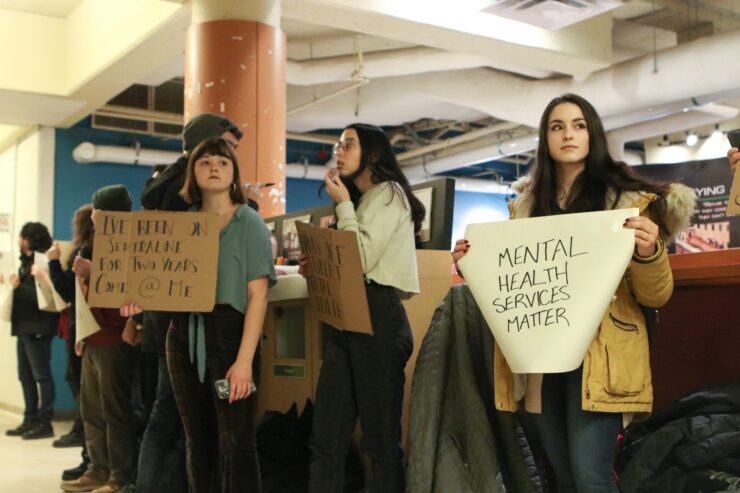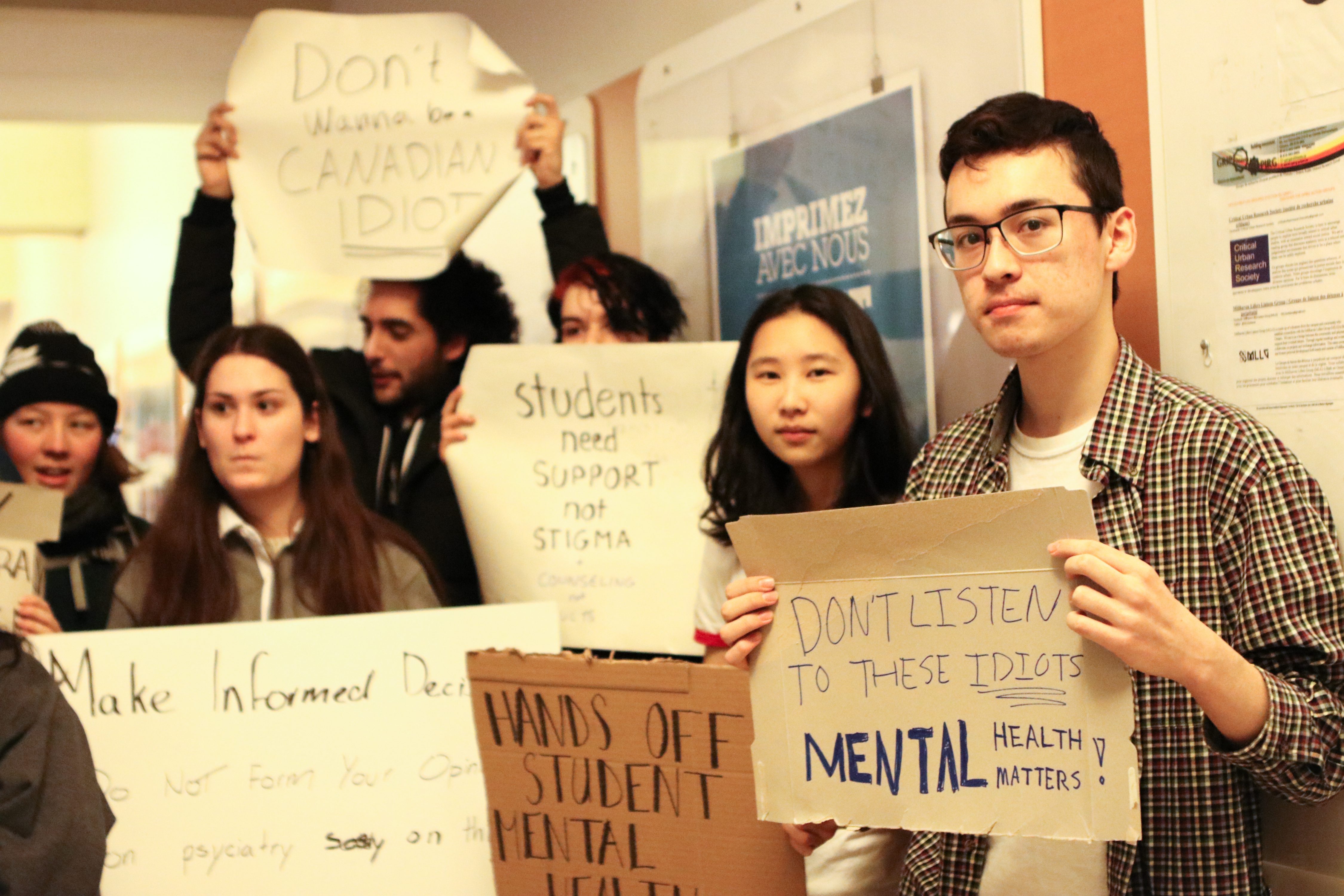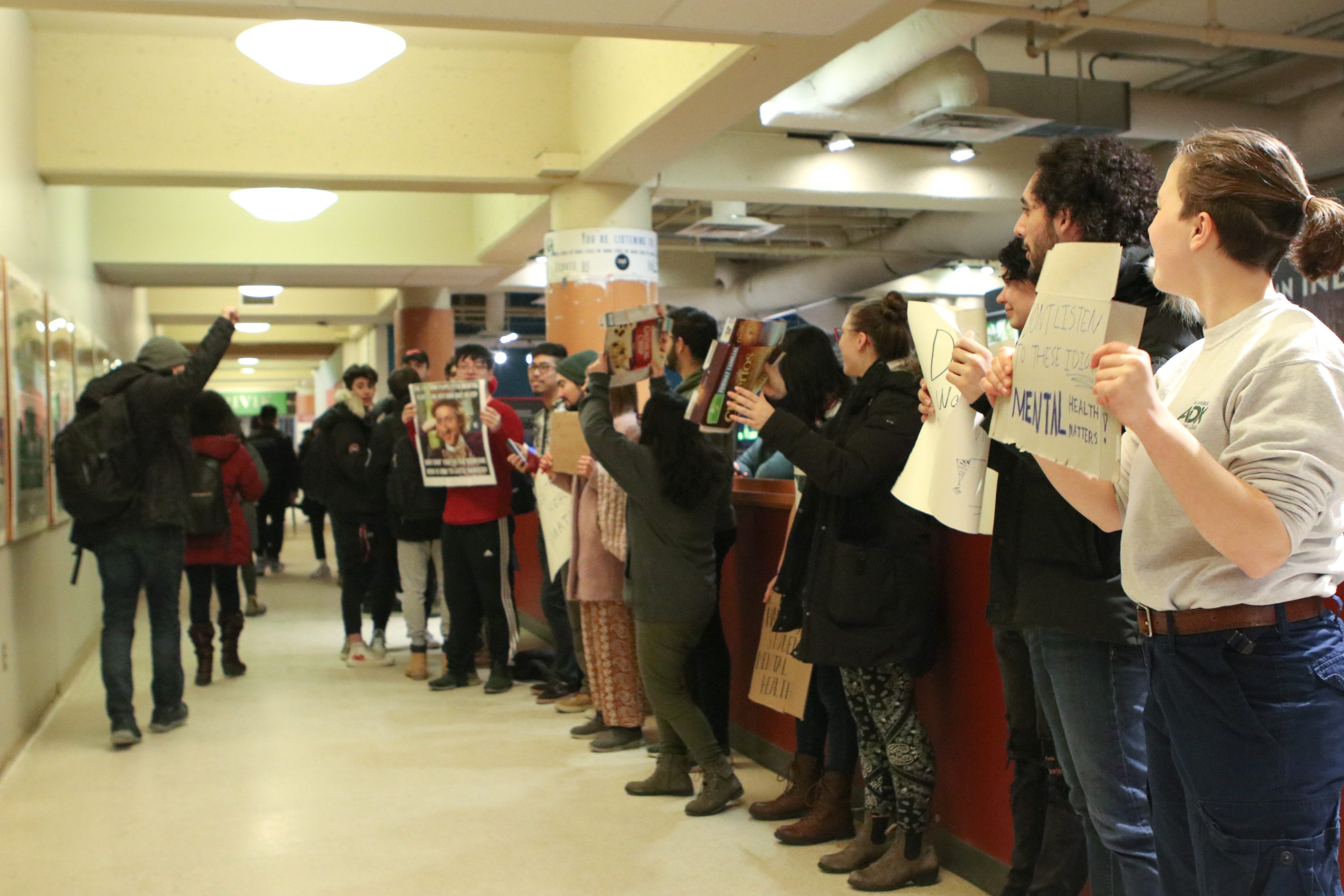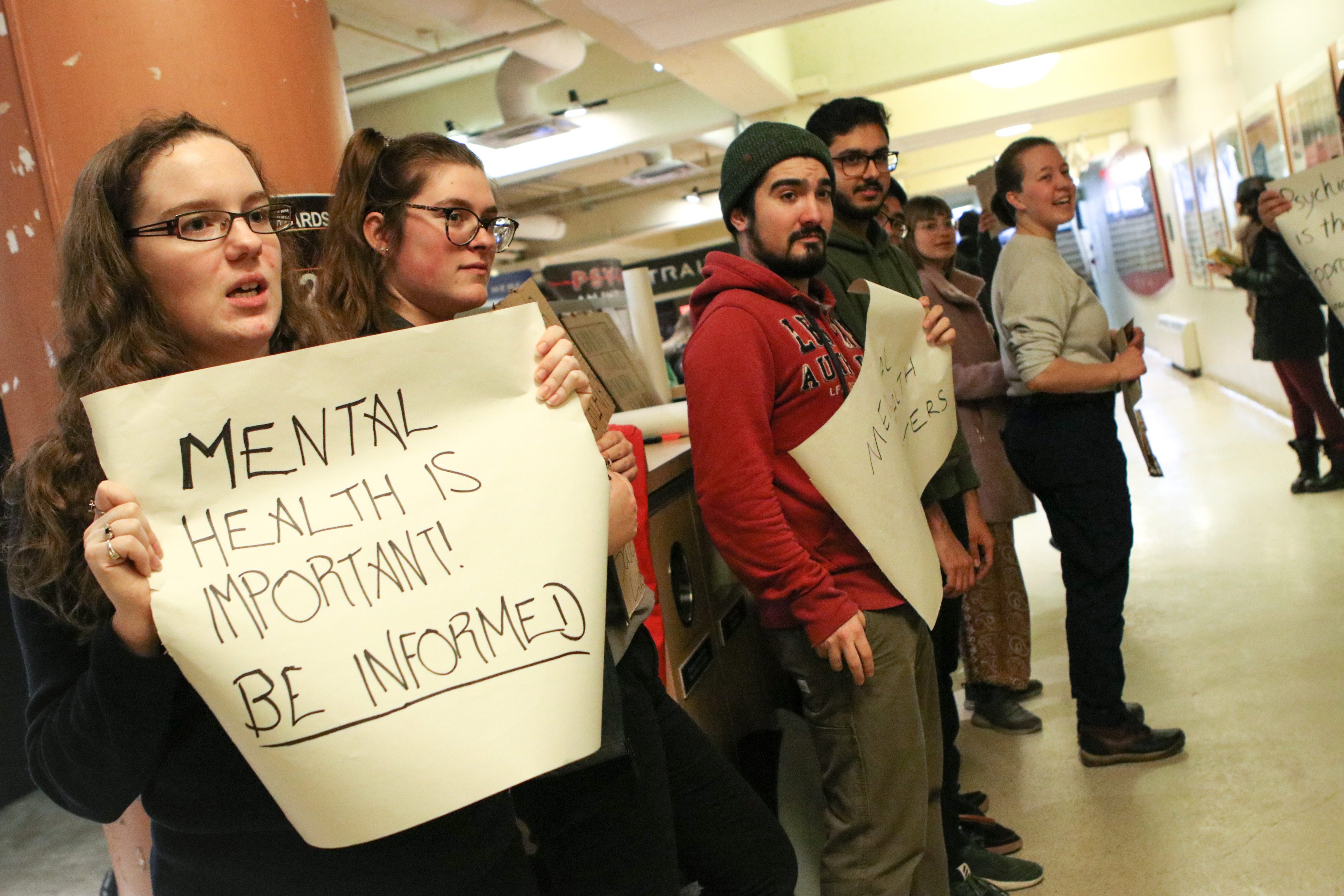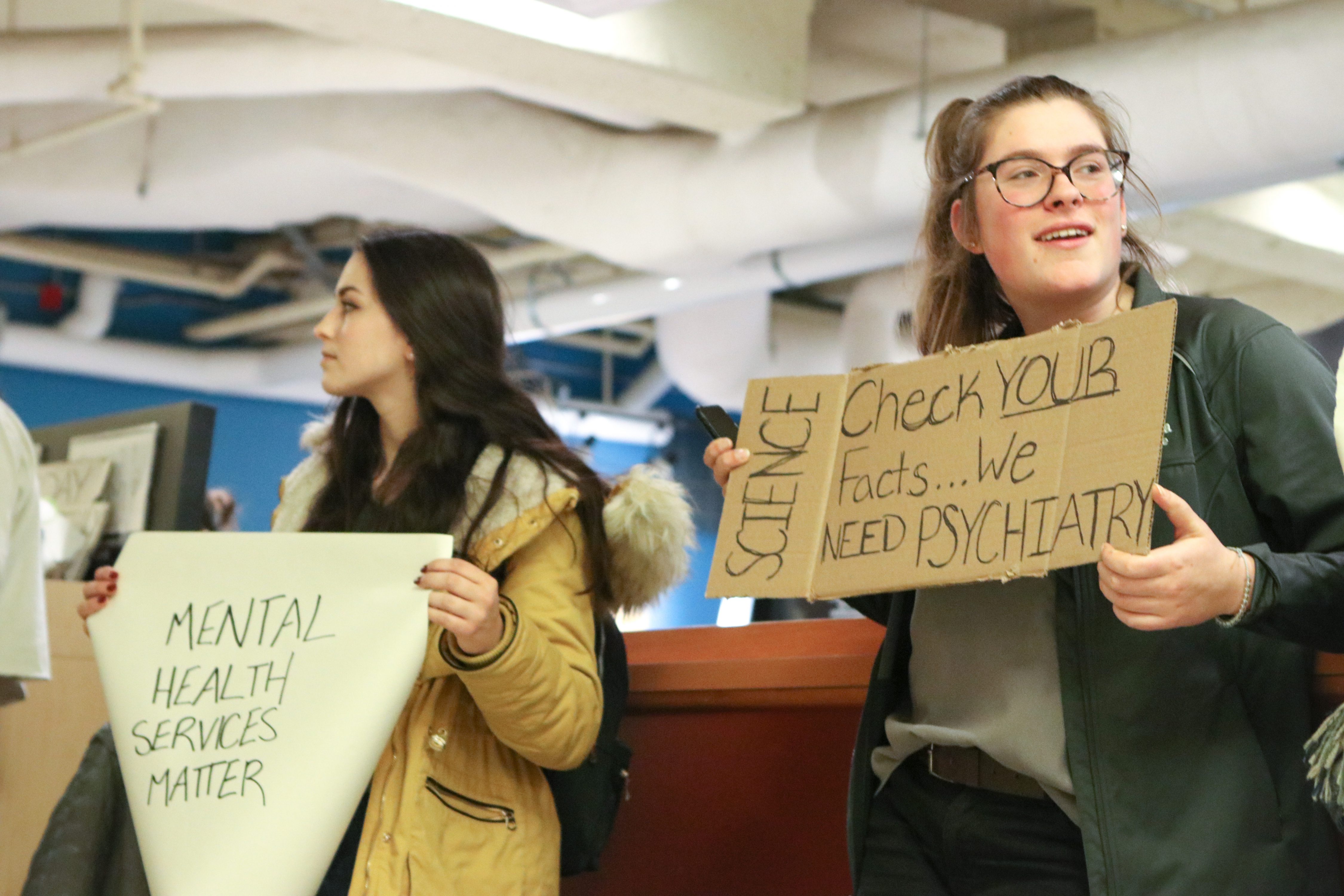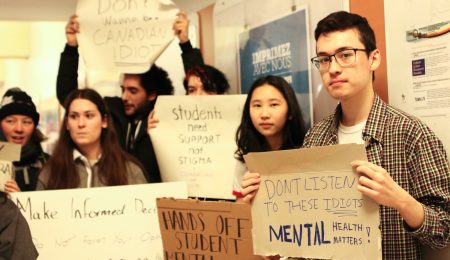Students also express frustration with school’s handling of situation
Dozens of University of Ottawa students spent hours on Wednesday protesting outside of the Scientology linked anti-psychiatry exhibit that is being shown all week in the University Centre, with many expressing their frustration with the school and its passive approach to the display.
Equipped with a variety of signs that contained messages related to mental health awareness and criticism of the exhibit, protestors also recited chants such as “students for mental health,” and “Scientology has got to go.”
“It’s about letting people know who pass by that the information being presented to you (at the exhibit) is not 100 per cent accurate,” said Maitee Quirion, a first-year political science student who’s been protesting the display since Monday.
The goal of the demonstration, Quirion said, isn’t to convince people to believe one thing over the other, but rather to get people the right information.
“It’s important that people don’t take this as the truth,” she said.
She added that having the exhibit on campus is a disgrace to the university.
“I don’t know why the administration is allowing something like this to occur,” said Quiron. “It’s embarrassing honestly, to have this in a university (building) so close to the faculty of social sciences.”
The Citizens Commissions on Human Rights (CCHR), the Scientology affiliated organization behind the “Psychiatry: An Industry of Death” exhibit, describes itself on its website as a “mental health watchdog” that has “taken a stance against the biological/drug model of ‘disease’ that is continually promoted by the psychiatric/pharmaceutical industry as a way to sell drugs.”
Robert Dobson-Smith, the president of CCHR Canada, said that the 14-panel exhibit — which contains graphic images of the Holocaust and features panels such as “Inventing Disorders to Sell Drugs” — is not intended to come off as insensitive.
“It’s directed toward people that want to control and have a prescribing practice,” said Dobson- Smith. “They control what drugs you take and they prescribe drugs for you, and they also control what information you got. And as far as we’re concerned, in most cases, the information you get is incomplete.”
Camelia Skaf, a second-year French and applied ethics student who helped organize the protest along with eight other students, said that it’s “appalling” how inaccurate the information being presented at the exhibit is.
“If you take the time to actually go and look at (the exhibit), you’ll see there that there’s a lot of information that is being disproved today by modern science, a lot of information that is being disproved by even professors at the university,” said Skaf.
In an online statement, the University of Ottawa Students’ Union (UOSU) said that they stand with those students who are condemning the CCHR and their exhibit.
“The exhibit … puts forward unfounded ideas that students should not seek mental health support,” reads the statement. “The UOSU stands with the science in acknowledging psychology and psychiatry as an important component of mental health support.”
Isabelle Mailloux Pulkinghorn, the U of O’s media relations manager, said via email that the university’s stance on the matter has not changed since Tuesday, which is that they don’t support the views expressed in the exhibit.
“The mental health and well-being of our students, staff and faculty (are) of paramount importance to the U of O,” she wrote.
Demetra Sainas, a second-year health sciences student who also helped organize the protest, said that she doesn’t believe that the university should be giving the CCHR a platform to share their views.
“Especially as the university has been dealing with such a mental health crisis for the past couple of months,” said Sainas. Last year, the U of O saw four student deaths, culminating in thousands of petition signers demanding the administration improve its mental health services.
In the wake of the string of deaths, Sainas said that the university needs to step up and do a better job of taking care of its students.
“I really want to come to a university that’s willing to stand up (for) its students. I think this is the opposite of standing up for them,” she said. “Why is it up to the students to protect others?”
Similarly, Babacar Faye, a third-year political science and law student who also helped organize the protest, said that he’s frustrated by what he described as tone-deafness on the university’s part when it comes to dealing with issues related to mental health on campus.
“I honestly feel very tired. I feel that I shouldn’t be here. I shouldn’t be here to speak for mental health, to speak for other students,” said Faye, who’s also a member of the UOSU’s Board of Directors.
“I think it’s time to act and to show to the administration that we won’t accept things anymore,” he said. “This is ridiculous.”

